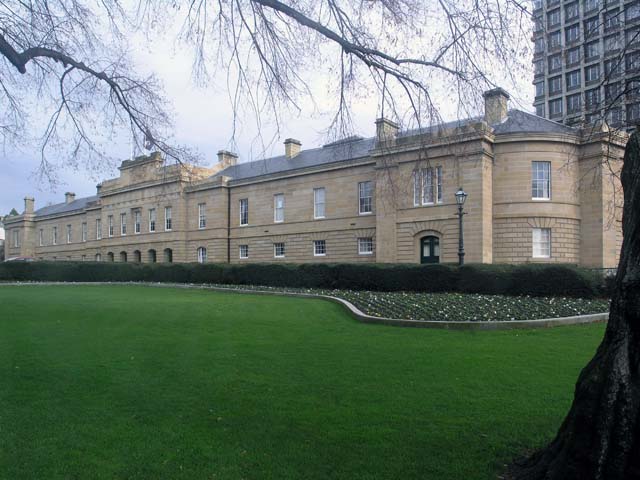The imperative of acting on climate change and peak oil seems to be lost on our parliamentarians, who appear far too busy denigrating each other to address real issues. [9 June 2009 | Peter Boyer]
Oh, those innocent smiles of a bygone era! Who can forget the happy faces of Michael Field and Bob Brown when they fronted the television cameras to announce the coalition that ended the dominant premiership of their arch-enemy, the Liberals’ battle-scarred Robin Gray?

Having been damaged by past political vandalism, our parliament continues to be treated as a vehicle for petty squabbling instead of an agent for genuine and much-needed change.
The legislative record of Tasmania’s Labor-Green Accord, 20 years old last month, suggests it was a high point in Tasmanian political and social reform. According to Robin Gray, it was a disaster.
With next year’s election set to deny once more an absolute majority to any party, and with closely similar Labor and Liberal policies, Mr Gray has proposed that the two parties form a “war cabinet”. His statement was an odd echo of the view of his old nemesis, Bob Brown, that the Greens were the only real opposition to a Labor-Liberal “Tweedledum and Tweedledee”.
Then Mr Gray’s Labor opponent Michael Field emerged from the shadows to proclaim that a Labor-Liberal alliance went against 100 years of Labor tradition. We don’t do alliances, he said. At least, not since the Accord collapsed in acrimony in 1991.
As a result of that public quarrel, Michael Field shares Mr Gray’s strong dislike of the Greens, and some of this seems to have filtered down to Mr Field’s latter-day successor, David Bartlett. In the context of today’s global environmental crisis, this continuing antipathy is as ugly as it is unwise.
This is not a one-sided affair. In pursuing their environmental agenda down the years, the Greens have tended to confront rather than converse, to assume the high moral ground and deny anyone’s claims to a place alongside them, a position guaranteed to rankle.
But whatever the sins of the Greens, nothing justified the vandalism committed on the Tasmanian body politic in 1998 when Labor leader Jim Bacon and then-Premier Tony Rundle got their heads together and adopted Mr Field’s idea to reduce the Parliament to 40 members.
Under the pretext of lowering parliamentary costs, the major parties sought to cut the Greens out of the 25-member rump that we continue to call the House of Assembly. It was cynical, reckless, and ultimately futile. Green representation in the lower house is now proportionally higher than ever.
We are facing a supreme challenge from climate instability and our island’s complete dependence on imported transport fuel in the face of diminishing global oil supplies. Together, they are clear justification for parties to discard their vainglorious isolation and come together, drawing on what’s left of the parliamentary talent pool.
But what have we got? A parliament too small for good government. Members denigrating other members, preferably on television. Leaders past and present talking as if a Green-tinged parliament is a greater threat than global warming or peak oil: fiddling while Rome burns. This is truly sad.
Having failed to acknowledge the damage done by their parliamentary numbers experiment, neither Labor nor Liberal members are giving policy on climate and energy the pre-eminence it clearly deserves. If they think these ticking environmental time bombs are a national or international problem and don’t need the full attention of state governments, they couldn’t be more wrong.
There is so much to be done, and so little time to do it in. Our only option is to work together, but this will require a goodwill that none of the party leaders — Greens included — has yet been able to muster. Is there no-one able to rise above petty politicking?
• Tasmanians can show their concern about climate issues by joining the Australia-wide National Climate Emergency Rally at 12 noon next Saturday, June 13, on Parliament House Lawns, Hobart.
